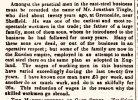Grenoside Metalworker
New Member
I am currently researching cast or crucible steel making in the Sheffield area in the 18th century. Jonathan Tingle was an early exponent of this highly skilled trade, and in his later life was well reputed, so much so that he travelled Europe the1820s with two of his sons, advising various government's on setting up their own steel industries post the Napoleonic Wars. However how he gained such a reputation is a bit of mystery.
I know Jonathan served an apprentiship in Sheffield in the process of crucible steel making, along with two of his brothers, before he moved to Birmingham in about 1886 at the age of 26, with his young family. He was was settled there, with five of his children being christened there. He was a dissenter, probably a Calvinist, but no records can be found as to where his children were actually christened.
Through the Birmingham Iris back copies I have determined that he was in partnership in the mid 1790s with John Wade, William Wade, and John Dutton as 'cast steel founders' on Lower Fazeley Street, at premises known as the 'Birmingham Steel Furnace.' His partnership with Wade and Dutton was dissolved early in 1796, Dutton and Wade continuing the business until it finally failed in 1798. Jonathan left Birmingham in 1799 a relatively rich man, and returned to his home village of Grenoside to become a landowner, and farmer, and a 'Gentleman.' Three of his sons successfully continued the trade in Sheffield until the 1840s, until the the small rural works were overshadowed by the but larger works in Sheffield and the Lower Don Valley.
Jonathan's family had links to the Walkers of Rotherham, the UKs leading iron founders of the time, who in turn had business and investment links with Mathew Boulton and James Watt.
So how did Jonathan gain such a reputation. It would appear it was made in Birmingham. So was he linked to Boulton's early attempts to set up his own steel making rather than buy in steel from Sheffield, for his dies for his Mint and later for parts for his Steam Engines? Was he recognised as one of the first cast steel producers in Birmingham, or was he just one of many, if so were did the investment come from? So could anyone help unravel this mystery to help me determine exactly what Jonathan Tingle did in Birmingham in respect to steel making in the period 1786 to 1799, and or any other useful info to allow me to research the topic further. Many Thanks.
I know Jonathan served an apprentiship in Sheffield in the process of crucible steel making, along with two of his brothers, before he moved to Birmingham in about 1886 at the age of 26, with his young family. He was was settled there, with five of his children being christened there. He was a dissenter, probably a Calvinist, but no records can be found as to where his children were actually christened.
Through the Birmingham Iris back copies I have determined that he was in partnership in the mid 1790s with John Wade, William Wade, and John Dutton as 'cast steel founders' on Lower Fazeley Street, at premises known as the 'Birmingham Steel Furnace.' His partnership with Wade and Dutton was dissolved early in 1796, Dutton and Wade continuing the business until it finally failed in 1798. Jonathan left Birmingham in 1799 a relatively rich man, and returned to his home village of Grenoside to become a landowner, and farmer, and a 'Gentleman.' Three of his sons successfully continued the trade in Sheffield until the 1840s, until the the small rural works were overshadowed by the but larger works in Sheffield and the Lower Don Valley.
Jonathan's family had links to the Walkers of Rotherham, the UKs leading iron founders of the time, who in turn had business and investment links with Mathew Boulton and James Watt.
So how did Jonathan gain such a reputation. It would appear it was made in Birmingham. So was he linked to Boulton's early attempts to set up his own steel making rather than buy in steel from Sheffield, for his dies for his Mint and later for parts for his Steam Engines? Was he recognised as one of the first cast steel producers in Birmingham, or was he just one of many, if so were did the investment come from? So could anyone help unravel this mystery to help me determine exactly what Jonathan Tingle did in Birmingham in respect to steel making in the period 1786 to 1799, and or any other useful info to allow me to research the topic further. Many Thanks.

